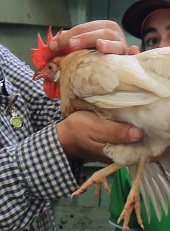 Decode animal behaviours: study what's going on in the animal brain.
Decode animal behaviours: study what's going on in the animal brain.
Sneak Peek
What's the difference between a domesticated cat and a feral cat? Can animals feel joy and sadness? How do baboons show anger?
Learn how to decode animal behaviours with this short course.
There are general, broad factors at play though in any animal species. Getting to know those factors is the basis for dealing with those animals more appropriately, whether in the wild or captivity.
Covering everything from instincts and ritualised behaviours through to domestication, Animal Behaviour and Psychology provides a solid foundation in the workings of how animals think. Excellent for anyone owning a pet, working on a farm, in a zoo, a wildlife refuge, in animal control, in vet care, and more.
Course Contents
This course has eight lessons. Each lesson has a corresponding online self-assessment test.
Lesson 1: Introduction to Animal Behaviour
- Interpreting Animal Behaviour
- Descriptions of Animal Behaviour
- Factors that Influence Behaviour
- Additional Reading (Goats, Cats, Dogs)
 Lesson 2: Animal Perception and Cognition
Lesson 2: Animal Perception and Cognition
- Introduction
- Perception
- Sight
- Hearing
- Smell
- Taste
- Touch
- Dexterity
- Cognition
- Additional Reading (Animal Perception, Types of Stimuli)
Lesson 3: Innate or Native Behaviours
- Innate Behaviours
- Instincts
- Fixed Action Patterns
- Innate Releasing Mechanisms
- Ritualised Behaviours
- Maturation
- Feeding Behaviour
- Other Eating and Drinking Adaptations
- Orientation
- Locomotion
- Biological Rhythms
- Sexual Behaviour
- Reproduction
- Additional Reading (Feeding Cats, Dog and Cat Obesity, Sexual Behaviour, What Animals Eat)
Lesson 4: How Animals Learn
- What is the Point of Learning?
- Types of Animal Learning
- Environment and Learning
- How Instincts and Learnt Behaviour are Related
- Animal Attachments
- Animal Parenting
- Additional Reading (Why Animals Learn, Equine Behaviour, Conditioning)
 Lesson 5: Specific Types of Animal Behaviour
Lesson 5: Specific Types of Animal Behaviour
- Mating
- Social Behaviour
- Dominance
- Territoriality
- Aggression
- Additional Reading (Social Behaviours, Horse Temperament, Aggression in Dogs)
Lesson 6 How Animals Communicate
- Introduction
- What is Communication?
- Types of Animal Communication
- Do Animals Understand Human Language?
- How Animals Communicate
- Additional Reading (Communication in Dogs, Understanding Cat Behaviour)
Lesson 7 Animal Mentality
- Animal Intelligence
- Animal Emotion
- Animal Psychopathology
- Additional Reading (Dog Depression, Bird Behaviour Problems, Five Ways to Ensure a Happy Pet)
Lesson 8 Managing Animal Behaviour
- Our Need to Manage Animal Behaviour
- Why Do We Domesticate Animals?
- Canines - Managing their Behaviour
- Felines - Domestic and Wild Cats
- Equines - Training Horses
- Cattle
- Training Wild Animals in Captive Environments
- Additional Reading (Equine Therapy and Rehabilitation, Dog Problems)
Learn How Behaviour Can be Affected by Both Instinct and Learning
Even many instinctual behaviours, such as those discussed in the last chapter, are not totally devoid from learning. Sometimes behaviours may appear to be innate but they can improve with repetition - which suggests that some learning has taken place. In fact, there are very few innate types of behaviour that don't become modified through experience.
Critical Periods
Critical periods are an example of a condition which involves innate behaviours but also learning. Critical periods are genetically determined time periods in an animal's life where the animal is ready to learn a specific type of behaviour. If the animal receives the correct environmental stimulus during this period it will learn the behaviour. If it does not receive the stimulus the gene will be turned off and it will fail to learn the behaviour - even if it is exposed to the stimulus after the critical period has ended.
Some animals may have just one critical period, others may have several critical periods of learning which affect subsequent behaviour. These mostly occur around the time of birth or within the first few weeks of life. These periods include behaviours such as how an animal bonds with its parents, how it interacts with other animals or people (socialisation), suckling behaviour, learning to call, or recognising parents.
Sensitive Periods
In some instances, there may be an optimal time for learning a behaviour but it is not critical. These are referred to as sensitive periods. During sensitive periods an animal can still learn the behaviour, just not as efficiently.
Genetic Preparedness
Genes also play a role in learning through preparing animals for learning. Genes may determine what types of behaviours an animal will learn. Usually, the type of behaviour that an animal might be prepared to learn will assist with its survival.
WHO IS THIS COURSE FOR?
This course is designed for:
- those who want to understand their pets,
- those who work on a farm,
- those who work in a zoo, a wildlife refuge, in animal control centres, vet care, and more.